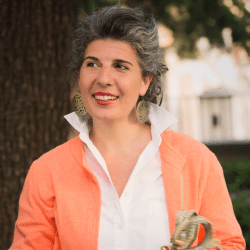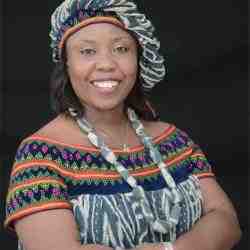Introduction
In a country with the highest rate of femicides and sexual abuse in Latin America, Daniela is giving men a prominent role in reducing gender-based violence by redefining masculinity and the woman’s role in Bolivia.
The New Idea
Daniela leads a movement to change cultural mindset towards the treatment of women in Bolivia and in particular stop the gender-based violence that has rampaged society. Core to her approach is working with both men and women. In doing so, she is shifting the narrative and reality of the woman’s role in society and how she should be treated. Moreover, Daniela ensures that men have the prominent role in reducing femicide and sexual abuse cases while simultaneously shifting the narrative--addressing what masculinity looks like when gender roles and norms are shifted.
Through her work within the schools and with the parent-teacher associations, Daniela is able to reach children and their familiar units to raise awareness and devise preventive strategies for solving misogyny within the home and in the community. Daniela also strategically works within those institutions that have traditionally been connected to promoting out-dated narratives on gender-roles and unintentionally enabling the narrative that could justify violence towards women. By partnering with the Bolivian Military academies and the Police Force, she is turning these unintended enemies into allies in order to reduce incidences of sexual harassment and violence.
In addition, Daniela influences public opinion by introducing the issue of violence against women into the public agenda as a civil society issue. To do so, she uses mass media flash mobs to spread the message against gender violence. Furthermore, due to her experience as a lawyer; Daniela has created protection mechanisms that go beyond legal assistance; it points to the empowerment of victims and the strengthening of legal rights for women and victims of gender violence.
The Problem
Gender violence is the most widespread abuse of human rights. Worldwide, one in three women is raped physically or sexually, with the main culprit being their partner. However, Latin America is known for its traditional patriarchal culture. 14 of the countries with the highest rates of femicide by a partner, reside in Latin America; statistics from UN Women has measured that 60,000 women are killed per year.
In November of 2017, General Secretary of Organization of American States, Luis Almagro affirmed that violence against women and girls in Latin America remains one of the most worrying phenomena in the region, despite the creation of new policies and laws in Latin America. The legal ramifications have failed to create true change at the societal level and Bolivia is not an exception. However Bolivia ranks amongst this highest for it’s reported gender-based violence crimes.
According to the Bolivian Center for information and Development of Women, every three days a woman dies at the hands of her partner. In Cochabamba--the municipality with highest rate of gender violence--studies by the National Institute of statistics (INE), indicate that one of every three women experience violence from their partner. Furthermore institutions meant to keep peace peace and order like the police force and the military are not responding to cases of abuse. Instead of supporting victims, they are also promoters of it and contribute to the epidemic of violence against women and the old ways of thinking about the role of women and men in society.
Despite being a country where women represent 50% of the labour force, the issue of women is not a priority in the institutions of Bolivia. Also, the problem is always approached from the women and not taken men in mind as the main promoters of the violations of the rights of women.
The Strategy
In order to shift the machista culture and to change how women and men view their roles in society, Daniela is working with schools, the military, police and local government. Core to her strategy is putting men in charge and engaging the community to spread the non-gender violence message to create actions to change the role of men as actors and not as perpetrators. Moreover, she uses social media as a tool to openly speak about misogyny and to bring a new perspective in addressing the gender-based violence issue.
Daniela works to redefine the role of the male, in order to reduce gender-violence. Through her organization "Huellas y Futuro", Daniela is partnering within the schools and the parent teacher associations (PTA) to reach both the students and their parents. She provides after school informative workshops for both parents and kids and also works with the teachers, helping to re-shape the school curriculum to incorporate key elements of her message to reduce gender based violence. Her workshops are divided in 3 levels: 1) Informative workshops: in which parents, students and community leaders are given access to basic information about gender violence. This information includes statistical reports to raise awareness about the problem, inherently highlighting the gravity of the issues and what agencies and legal efforts are currently out there to support and protect victims of sexual abuse, 2) diagnostic workshops: in which Huellas y Futuro staff create actions to identify possible situations of violence among the attendees. In these sessions, Daniela works with families who have been subjected to violence and gives them free psychosocial assistance and restores family ties to rehabilitate victims and aggressors. 3) training workshops: At this stage parents and men are provided with tools to identify, break, prevent violence, replicate the methodology and spread the non violence against women message in other groups. Also, replicators in this stage are able to promote and create activities to prevent violence against women. It is worth noting that Daniela’s methodology is incorporated into the curricula and educational plans of all schools in Cochabamba, and she has already begun to expand into other regions of Bolivia.
Since 2015, she has worked in 12 educational schools and has impacted over 6300 people; 1200 children (5 to 12 years old), 1900 adolescents (ages 13-18), 3000 parents, 130 teachers and 40 directors and administrative staff. In addition, she has rehabilitated 50 families who have changed practices and patriarchal behavior. For instance, in one of the schools where Daniela is working, 2 8th grade girls were bullied--victims and bullies were invited to work with the psychologist and they confirmed that most of them were victims of domestic violence and misogyny practices in their families. Daniela started to work with them but also with their parents whom received material about gender violence awareness. Afterward, parents and children agreed upon actionable activities to reduce violence within the home and results were surprising: students and parents shared heartfelt testimonies where fathers asked in public for their wives forgiveness for their violent tendencies, bullies apologized to their partners and even a police officer who was one of the participating parents-- who said he was skeptical about Daniela’s work but now-- vowed to shift his actions towards his family to teach ways of reducing and avoiding familiar violence. Since this experiences, several students and parents started to work as volunteers and as replicators of Huellas y Futuro activities in other schools and encourage other families to be part of this actions.
Daniela has also published the "Manual for educational communities on the prevention of violence"; This material has been delivered to each educational establishment and parent meetings in the city of Cochabamba. In partnership with SEDUCA (departmental Directorate of education), the project will be in 15 new schools and through them, opening the door to new institutions in order to replicate nationwide. In addition to schools, and SEDUCA, Daniela is an ally of organizations such as: Future 4 Children, SDC (Switzerland Cooperation of Bolivia), UBS, and the UCATEC University.
Also, in alliance with the UCATEC University and the support of the University of Innsbruck, Austria, Daniela is creating a Diploma for professionals in peace and international conflict transformation studies. In partnership with the Director of the program at the University of Innsbruck, Wolfgang Dietrich, Daniela decided to create a program to professionally train people interested in peace culture and gender violence. Participants include teachers of universities, military, psychologists and professionals that can impart the non-violence knowledge from a professional point of view. Underlying this academic alliance and training of graduates students is the idea to facilitate and coordinate a network of teachers and students as a means to establish a peace actors network in Bolivia and Internationally to spread the nonviolence message. Also, Daniela with her partners in peace and international conflict transformation studies created a coordinate a network. This network is composed by different actors that are working in conflict resolution and with them, she is organizing international actions and assisting to events in order to talk spread the violence against women message and also, in the future, linked this international network with the Bolivian network.
Daniela not only works in schools, but also with unintended enemies like the Bolivian Military academies and Police forces who have shown great openness to change of mentality. So far, she has impacted over 3,000 militaries from varying military academies, training them on how to respond to and the prevention of violence against women in domestic environments. In relation to the police, Daniela works with the the Special Forces Unit for the Fight Against Violence (FELCV). Before Daniela’s efforts, officials did not have training on how to work with woman who were sexually or domestically abused and furthermore how to treat them. Core in this work with the police is that now they are better able to identify and respond to cases of abuse and have a system for formalizing complaints and tracking the cases through the justice system As part of the success of Daniela’s model within this institutions, most recently Daniele in coordination with FELCV launched a March to reject the violence towards women, specifically occuring on the Day of the Man in Cochabamba; In attendance were over 3,000 men showing their solidarity for their female counterparts.
Daniela is also influencing in the political issue in Bolivia. Thanks to her important work as a lawyer and her experience at the Court in Cochabamba in the defense of women’s rights, Huellas y Futuro was the only civil society organization to take part in the drafting of the Cochabamba departmental law of prevention and care in cases of violence against women, adopted in 2017; There is now a whole chapter of law dedicated to the prevention of gender-based violence because of Daniela’s efforts. On top of this work, she is also working with prosecutors and the President of the legislative power to draft similar legislation in other States of Bolivia as La Paz. But also, Daniela also works with vice-mayors in the communities of Cochabamba which also are connected to the Organization of Community Leaders of the base of the pyramid (OTB) this groups have representation in each neighborhood in Bolivia; with the support of the leader of the OTB, Miguel Chambi, the leaders of these organization attend to Huellas y Futuro activities in order to articulate communities with the work of the organization.
Daniela is changing the perception on gender violence in the public agenda by making use of the media (radio, press and television). To reach young people, Daniela uses Storytelling and social networks as a tool to the change mindsets; their media campaigns and flash mobs are creative and compelling to consolidate the values of non-violence against women. As social networks and media are important, Daniela produces media campaigns supported by the participants of her workshops providing interactive information, pictures and videos focused on gender-based violence issue. Most important to this communications strategy is that she is publicizing new ways of treating women, through visible displays of action from men and women alike. For instance, replicators made calls on the Facebook website of contests of poetry, drawing and also made a call to a graffiti with the no gender violence message and a flashmob in Cochabamba’s downtown.
The Person
Daniela grew up in a loving and very traditional family; since her childhood she was limited by being a woman; especially during her school age year. As she was studying in a Catholic school, she felt undervalued as a woman; However rather then letting this defeat her, she challenged it leading her to form a Center for students and student movements. However, this challenging of the status quo still left her feeling limited; opportunities disappeared simply because she was a woman. When she moved to Cochabamba to study law, she saw that it was very common to hear cases of children abused by their parents and in situation of exploitation; Daniela wanted to contribute to solve this problem and in order to formulating strategies for it, she decided, with her partners, to create a working group and to propose a solution to the problem of abuse girls.
Later on, Daniela moved to Europe, and she acquired higher and best professional tools for helping people of her country. She did two master's degrees; one in Switzerland and one in Austria. At the end of their studies in Europe, Daniela had a 3 month relationship ending in violence; both psychological and economic. She decided to flee without money and without a place to go. Her own situation made her think about the victims she worked with in Cochabamba and after having experienced gender violence herself, she realized she had to do something; she pledged to end gender-based violence and to change the sexist mentality in order to provide equal opportunities to women.
Upon returning to Bolivia, Daniela started to work in the District Court and she becomes aware of three main things: most of the authorities were men, high levels of corruption, and women claimed all the judiciary but did not occupy any power position. Despite this disappointment, daniela did manage to work formally in Court providing free family assistance for low-income women; This gave her much publicity, but she understood women did not have sufficient access to information and for her it was very important to open mechanisms and institutions for protecting women. In addition she devoted to work in the country's largest companies, and as she observed top positions were occupied only by men, this led her to question again why women failed to occupy such jobs. She decided to train women strengthening their knowledge; trying to change a macho society into a society of respect, where there is recognition of women in equal conditions and opportunities.




